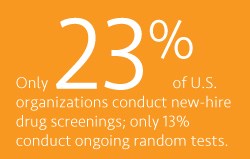Employee theft. Drug use. Negligent hiring.
One negative event at an organization can erase years of investment in building and developing employer brand. Furthermore, the unplanned costs to repair damages not only impacts profitability, but can turn future talent away from the organization while likewise harming retention. Ultimately, the costs of screenings and background checks are inconsequential compared to the backlash businesses may receive from bypassing this component of the hiring process.
In today’s volatile economic and ultra-competitive talent landscape, transparency and accountability are the name of the game; simply stated, organizations can’t afford to be wrong about the talent they hire.
Without further ado, this week’s background-check-intensive edition of Talent Acquisition Fast Facts:
There are currently 17 million freelance and contract workers in the U.S., a number that will outgrow the salaried workforce in less than six years; according to the Society for Human Resource Management, contract workers are far more likely to have a criminal record than full-time employees (and employers are far less likely to conduct background screenings for these workers).
-Society of Human Resources; Employment Screening Best Practices, First Advantage

Only 23% of U.S. organizations conduct new-hire drug screenings and only 13% conduct ongoing random checks; research shows organizations prefer county courthouse searches (79% use this method) and federal searches (34% use this method).
-Employment Screening Best Practices, First Advantage
Of the 21.5 million current (past month) illicit drug users aged 18 or older in 2012, 14.6 million (67.9%) were employed either full- or part-time.
-2012 National Survey on Drug Use and Health: Summary of National Findings, U.S. Department of Health and Human Services
The one-year retention rate for employees who are not screened is 58%; conversely, 89% of screened applicants are retained in the first year.
-The CareerBuilder Recruitment Guidebook, Featuring the Q2 2013 U.S. Job Forecast, CareerBuilder
Organizations lose negligent hiring cases 70% of the time, with the average jury award today reaching more than $1 million; comparatively, the average cost per applicant to conduct a drug screening and background check: $17.06.
-Society of Human Resources; Negligent Hiring: Employer Risk, ISO
In 2011, shoplifting, employee or supplier fraud, retail crime and administrative errors (accidental or planned) cost the retail industry $41.7 billion in the U.S. alone; of this amount, $18.4 billion was attributed to employee theft.
-Retail crime cost U.S. retailers $41.7 billion in 2011, Home Channel News
Do any of these statistics stand out to you? Is it possible that only 23% of businesses in the U.S. conduct new-hire drug screenings—or are there more effective screening programs than drug testing?
We’d love to hear your thoughts below!
